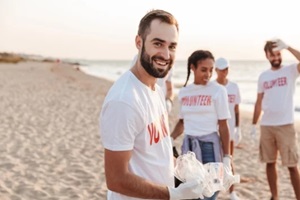 Volunteers are essential to many nonprofit organizations. They generously offer their time and skills to support important causes and missions. However, when volunteers take on certain key roles, such as handling products and conducting sales, they must receive proper training.
Volunteers are essential to many nonprofit organizations. They generously offer their time and skills to support important causes and missions. However, when volunteers take on certain key roles, such as handling products and conducting sales, they must receive proper training.
It’s also wise for organizations to obtain insurance for nonprofits to further mitigate risks.
The Dangers of Untrained Volunteers Managing Products and Sales
If volunteers jump into physically handling merchandise and selling items without sufficient guidance, it unfortunately sets the stage for problems. Here are some of the risks organizations are exposed to when volunteers lack training:
- Physical injury to volunteers from improper lifting, carrying, and handling of products, especially heavy, large, or hazardous items. Lifting oversized objects alone or with improper technique can result in back injuries and muscle strains.
- Damage to inventory from inadequate storage conditions such as extreme temperatures or humidity, careless shelving and stacking, and letting customers access fragile goods without supervision. High-value, perishable, and fragile merchandise is most vulnerable to mishandling.
- Loss and theft of valuable merchandise such as jewelry, electronics, designer goods, and small items that are easily pocketed when adequate security measures such as locking cases or storage rooms are not used consistently by volunteers.
- Injuries to customers during product demonstrations if untrained volunteers do not follow safety precautions and protocols. Allowing unsupervised handling of equipment or having people too close during a demo can lead to harm.
- Confusion and dissatisfaction from shoppers receiving inaccurate or misleading details from well-meaning but uninformed volunteers. Lack of knowledge of product specs, features, and usage can contribute to returns.
- Legal violations occur when volunteers are unaware of restricted merchandise regulations such as age-limited products, hazardous materials requiring special handling, or fundraising merchandise. Even unintentional violations create liability risk.
Key Areas of Instruction for Volunteer Product and Sales Training
The good news is that nonprofits can avoid most of these challenges with proper training on core topics. Key subjects to cover with volunteers include:
Safe Lifting and Transport of Inventory
Volunteers should learn basics such as lifting with knees bent, holding loads close to the body, getting help carrying larger objects, and using dollies or carts whenever possible. This protects both their health and the condition of merchandise.
Careful Handling and Storage of Goods
Instruction should cover treating all inventory carefully, following all package instructions, storing items within the recommended temperature and humidity ranges, keeping things clean, neatly organizing shelves, and limiting customer handling of easily damaged goods.
Securing High-Value and Hazardous Products
 Volunteers must understand that expensive, hazardous, or commonly stolen merchandise needs to be stored securely in locked displays, cages, cabinets, or backrooms. Only authorized volunteers should have access using assigned keys or codes.
Volunteers must understand that expensive, hazardous, or commonly stolen merchandise needs to be stored securely in locked displays, cages, cabinets, or backrooms. Only authorized volunteers should have access using assigned keys or codes.
Safe Setup and Demonstration of Products
Showing off products carries risks requiring safety training, such as keeping adequate space between demo areas and shoppers, making safety disclaimers, only allowing customer interaction under supervision, and having safeguards such as guardrails in place.
Providing Accurate Details on Merchandise
Volunteers should be taught to educate themselves on inventory using spec sheets, tags, packaging information, instructions, and product training resources. This enables them to share correct details and accurately respond to shoppers’ questions and concerns.
Following All Relevant Regulations and Requirements
Suppose any specific legal or organizational policies surround inventory, such as age limits on certain products, hazardous material handling procedures, or codes for donated merchandise. In that case, volunteers need to be informed of the proper protocols.
The Necessity of Documenting Volunteer Training
More than simply conducting verbal training is required to maximize risk reduction. By taking these steps, nonprofits need to document that volunteers have been appropriately informed on safety and regulations related to product handling and sales.
Signed Confirmation of Training Completion
Have volunteers sign a form stating they’ve received training on each relevant topic and understand the instructions. This protects the organization against claims that unsafe actions resulted from a lack of training.
Outline of Covered Topics and Taught Standards
Keep a training checklist and manual that spells out every subject covered and specific policies taught to volunteers. Having this on file demonstrates the scope of the instruction provided.
Periodic Retraining and Refreshers
Require set refresher training at least annually so volunteers stay up-to-date on evolving best practices and any new organizational policies. Document all retraining.
Insurance Considerations for Further Risk Mitigation
On top of training efforts, having proper insurance coverage provides another layer of protection for a nonprofit against product handling and sales risks.
General Liability Insurance
This essential policy protects against volunteer mistakes that lead to bodily injuries or property damage. Lawsuits from injured customers or damaged goods often fall under general liability claims.
Product Liability Insurance
 If a defective product harms someone, this specialized policy covers injury claims. It protects the organization if, for example, faulty sporting equipment sold by a volunteer malfunctions and injures a child.
If a defective product harms someone, this specialized policy covers injury claims. It protects the organization if, for example, faulty sporting equipment sold by a volunteer malfunctions and injures a child.
Director and Officer Liability Insurance
This insurance policy protects decision-makers within the nonprofit from claims alleging mismanagement. Mandating volunteer training helps show responsible risk management if ever questioned.
Get Confident Insurance Support with CI Solutions
Managing risks across a nonprofit requires specialized expertise. CI Solutions’ experienced professionals have an extensive understanding of insurance for nonprofits, ensuring you can protect your essential assets and stay laser-focused on the difference your organization makes through its mission, volunteers, and community programs.
Contact us today at 703.988.3665 or online, and let us help you with all your insurance needs.
